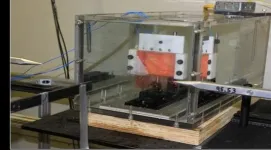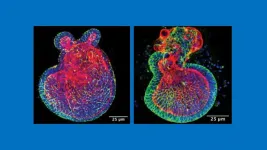(Press-News.org) Human rights law can provide a transparent and fair framework for vaccine allocations, researchers suggest.
- All countries face the ethical challenge of how to allocate limited supplies of safe, effective COVID-19 vaccines
- Researchers say that governments should look to human rights principles and commitments to help them decide who should get priority for the first available doses of COVID-19 vaccine.
- A human rights approach would include social vulnerability alongside medical vulnerability in decision-making because health is affected by social factors.
- National vaccine roll-outs should take account of these overlapping vulnerabilities
As Governments around the world wrestle with the question of designing a fair system to allocate their COVID-19 vaccine supplies for maximum protection against the pandemic, a team of researchers led by Dr Sharifah Sekalala of Warwick Law School propose that existing human rights legal principles should guide their thinking.
All 171 states have signed at least one human rights treaty, recognising that people have the right to life and health - but how can this guide decisions on distribution of vaccines when demand outstrips supply?
An Intersectional Human-Rights Approach to Prioritizing Access to COVID-19 Vaccines, published in BMJ Global Health, reviews current approaches to vaccine allocation, from the UK age-priority system to Israel's decision to prioritize healthcare workers and first responders, considers these from a human rights perspective, and outlines a model of an ethical intersectional distribution scheme based on human rights legal principles.
Lead author Dr Sharifah Sekalala said: "There are three fundamental human rights which need to be reflected in any vaccine distribution programme - the right to life, the right to health, and the right to benefit from scientific progress.
"In practice, the right to health means that vaccines should be made available to everyone. If there aren't enough vaccines available, then they should be given as a priority to people who are more likely to contract COVID-19, to those whose health is at higher risk of being compromised as a result of coming down with COVID-19, and to those who are most likely to transmit the virus.
"It's also a key human rights issue that vaccines be distributed without discrimination.
"Without a transparent framework that considers these human rights to guide decisions, governments are likely to be accused of unfairness or favouritism in their distribution plans."
The team recommend that governments adopt an intersectional approach to understand how different vulnerabilities and disadvantages affect a person's health.
Taking the example of age and economic status, the paper shows how a fair distribution scheme might prioritize a person from a low-income group compared to a person of similar age from a more well-off background, because economic deprivation, poorer living standards, and worse access to healthcare effectively age that person beyond their years.
Dr Sekalala explains: "In the UK many ethnic minority groups are more likely to be in informal or insecure jobs, live in overcrowded housing and have a lower social economic status. This can make it difficult for them to socially distance, thereby making them more susceptible than people of similar age in other circumstances. Data shows the tragic reality is that people from these groups were not only more likely to catch COVID 19 but also to die from it.
"A fairer and more effective prioritization system would have to take into account not only vulnerability to infection but also more structural underlying determinants of health that increases their vulnerability to the crisis."
Co-author Dr Katrina Perehudoff, Post Doctoral Research Fellow in European and Global Health at the Faculty of Law, University of Amsterdam (Netherlands), added: "This dangerous cocktail of social factors combined with low priority for receiving a vaccine can disadvantage people who are already socially vulnerable although they might not be medically vulnerable. This practice, which we also see in vaccine roll-out in the Netherlands and other countries, actually risks increasing the existing inequalities and injustices in society, running contrary to our governments' human rights commitments."
INFORMATION:
Sekalala S, Perehudoff K, Parker M, et al An intersectional human rights approach to prioritising access to COVID-19 vaccines BMJ Global Health 2021;6:e004462.
https://gh.bmj.com/content/6/2/e004462.full
Full list of authors:
Sharifah Sekalala, School of Law, University of Warwick, Coventry, UK
Katrina Perehudoff, Faculty of Law, University of Amsterdam, Amsterdam, The Netherlands
Michael Parker, Ethox Centre, University of Oxford, Oxford, UK
Lisa Forman, Dalla Lana School of Public Health, University of Toronto, Toronto, Ontario, Canada
Belinda Rawson, School of Law, University of Warwick, Coventry, UK
Maxwell Smith, School of Health Studies, Western University, London, Ontario, Canada
CONTACT
Sheila Kiggins,
Media Relations Manager,
Faculty of Social Science,
University of Warwick
S.kiggins@warwick.ac.uk
07876 218166
Future fully autonomous vehicles will rely on sensors to operate, one type of these sensors is LiDAR
LiDAR sensor's effectiveness in detecting objects at a distance in heavy rain decreases, researchers from WMG, University of Warwick have found
Researchers used the WMG 3xD simulator to test the sensor detection of objects in rain, simulating real world roads and weather
High level autonomous vehicles (AVs) are promised by Original Equipment Manufacturers (OEMs) and technology companies to improve road safety as well as bringing economical and societal benefits to us all.
All high-level AVs rely heavily on sensors, and in the paper, 'Realistic LiDAR with Noise Model for Real-Tim Testing of Automated Vehicles in ...
PITTSBURGH--Babies whose births were depicted in Bollywood films from the 1950s and 60s were more often than not boys; in today's films, boy and girl newborns are about evenly split. In the 50s and 60s, dowries were socially acceptable; today, not so much. And Bollywood's conception of beauty has remained consistent through the years: beautiful women have fair skin.
Fans and critics of Bollywood -- the popular name for a $2.1 billion film industry centered in Mumbai, India -- might have some inkling of all this, particularly as movies often reflect changes in the culture. But these insights came via an automated computer analysis designed by Carnegie Mellon University computer ...
Sea turtles are witnesses and victims of the high level of plastic pollution of the Adriatic Sea. A group of researchers at the University of Bologna analysed 45 turtles hospitalised at Fondazione Cetacea in Riccione and found plastic debris in their faeces. Besides confirming the role of turtles as ideal sentinels to monitor plastic pollution in the sea, the results of their analysis - published in the journal Frontiers of Marine Medicine - crucially show how the plastic debris in their intestines can dangerously alter their microbiota, eventually compromising their health.
"The results ...
RESEARCH TRIANGLE PARK, N.C. -- Research shows that Soldiers exposed to shockwaves from military explosives are at a higher risk for developing Alzheimer's disease -- even those that don't have traumatic brain injuries from those blasts. A new Army-funded study identifies how those blasts affect the brain.
Researchers at the University of North Carolina at Pembroke in collaboration with the U.S. Army Combat Capabilities Development Command, now known as DEVCOM, the Army Research Laboratory, and the National Institutes of Health found that the mystery behind blast-induced neurological ...
UNIVERSITY PARK, Pa. -- The optimal timeframe for donating convalescent plasma for use in COVID-19 immunotherapy, which was given emergency use authorization by the Food and Drug Administration in August 2020, is within 60 days of the onset of symptoms, according to a new Penn State-led study. The research also reveals that the ideal convalescent plasma donor is a recovered COVID-19 patient who is older than 30 and whose illness had been severe.
"Millions of individuals worldwide have recovered from COVID-19 and may be eligible for participation in convalescent plasma donor programs," said Vivek Kapur, professor of microbiology and infectious diseases, Penn State. "Our findings enable identification ...
CHAMPAIGN, Ill. --Many climate models focus on scenarios decades into the future, making their outcomes seem unreliable and problematic for decision-making in the immediate future. In a proactive move, researchers are using short-term forecasts to stress the urgency of drought risk in the United States and inform policymakers' actions now.
A new study led by University of Illinois Urbana-Champaign civil and environmental engineering professor Ximing Cai examines how drought propagates through climate, hydrological, ecological and social systems throughout different U.S. regions. The results are published in the journal Geophysical Research Letters.
"The same amount of precipitation, or the lack of thereof, in one region could have very different impacts on the hydrologic ...
Black men and women, as well as adolescent boys and girls, may react differently to perceived racial discrimination, with Black women and girls engaging in more exercise and better eating habits than Black men and boys when faced with discrimination, according to research published by the American Psychological Association.
"In this study, Black women and girls didn't just survive in the face of racism, they actually responded in a positive manner, in terms of their health behavior," said lead researcher Frederick Gibbons, PhD, with the University of Connecticut. "This gives us some hope that despite the spike in racism across the country, some people are finding healthy ways to cope." ...
ADELPHI, Md. -- Army researchers reached a breakthrough in the nascent science of two-dimensional polymers thanks to a collaborative program that enlists the help of lead scientists and engineers across academia known as joint faculty appointments.
Researchers from the U.S. Army Combat Capabilities Development Command, now known as DEVCOM, Army Research Laboratory partnered with Prof. Steve Lustig, a joint faculty appointment at Northeastern University, to accelerate the development of 2D polymers for military applications.
The collaboration with ARL Northeast led to a groundbreaking study published in the peer-reviewed scientific journal Macromolecules. Editors featured the research in a cover article.
"2D polymers have been studied very seriously from a synthetic ...
Researchers have developed a tool to identify security and privacy risks associated with Covid-19 contact tracing apps.
COVIDGuardian, the first automated security and privacy assessment tool, tests contact tracing apps for potential threats such as malware, embedded trackers and private information leakage.
Using the COVIDGuardian tool, cybersecurity experts assessed 40 Covid-19 contact tracing apps that have been employed worldwide for potential privacy and security threats. Their findings include that:
72.5 per cent of the apps use at least one insecure cryptographic ...
Medical researchers have long understood that a pregnant mother's diet has a profound impact on her developing fetus's immune system and that babies -- especially those born prematurely -- who are fed breast milk have a more robust ability to fight disease, suggesting that even after childbirth, a mother's diet matters. However, the biological mechanisms underlying these connections have remained unclear.
Now, in a study published Feb. 15, 2021, in the journal Nature Communications, a Johns Hopkins Medicine research team reports that pregnant mice fed a diet rich in a molecule found abundantly in cruciferous vegetables -- such as broccoli, Brussels sprouts and cauliflower -- gave birth to pups with stronger protection against necrotizing enterocolitis (NEC). ...





